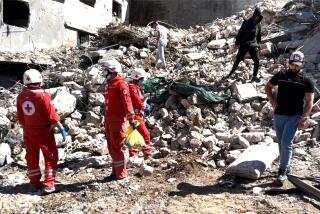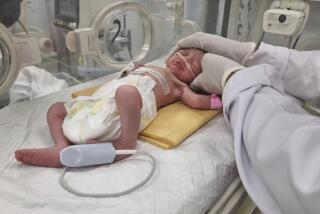Amid Curfews and Violence, Iraqi Women Turn to Midwives
- Share via
BAGHDAD — Deep in an east Baghdad neighborhood, along a muddy street where dogs, chickens and goats roam free, midwife Umm Halla has just delivered another baby boy, instantly named Muqtada.
The choice of name honors Muqtada Sadr, the anti-U.S. Shiite Muslim cleric whose supporters dominate the impoverished district of Sadr City. It also exempts the parents from Umm Halla’s fee of 20,000 dinars ($14), because, the midwife says, “We are all master Muqtada’s followers, and whatever we do it’s not enough because he is from prophet Muhammad’s bloodline.”
But there’s another reason, unspoken -- the urge to stay in the good graces of Sadr’s well-armed Al Mahdi militia, which exerts unchallenged control over the Shiite neighborhood.
The sign in Arabic above Umm Halla’s door says “Licensed Professional Midwife,” not that it’s needed. Every expectant mother knows where to find the woman whose name means “mother of Halla.”
“She is a qualified woman who has helped many of this neighborhood’s ladies give birth,” said Umm Hassan, who was at the clinic for a prenatal checkup, accompanied by her daughter Amal. Six other women were jammed into the tiny waiting room.
Umm Halla, 41, was certified a midwife by Saddam Hussein’s Health Ministry when she was 24, and has a delivery table with stirrups, oxygen and medical instruments. She says she averages about two births a day and doesn’t keep count of how many are boys named Muqtada.
The midwife profession has grown since the Iraqi government imposed an overnight curfew and it became too dangerous to race to the hospital in darkness through poorly marked checkpoints and jumpy American or Iraqi soldiers. Some rides to the delivery room have ended in death.
Umm Halla has just delivered twin boys by Zahra Badr, 35.
“I named the older boy Muqtada to show honor to our leader, Muqtada Sadr,” the mother said. The younger, named Abdullah, will cost her 20,000 dinars.
Umm Halla hasn’t yet weighed the newborns or checked their vital signs, but she declares them “two healthy strong boys.” Wrapped unwashed in white cloth, they lie on a table with relatives looking on adoringly.
For those who can afford it, the Dominican-run Hayat hospital in central Baghdad boasts cleanliness, good management and its own generator supplying electricity around the clock -- a luxury in post-invasion Iraq.
At the Hayat, a normal birth costs about $140 -- 10 times Umm Halla’s price -- and a Caesarean can cost $520. There are no discounts for choice of name.
Enas Abdul, 33, a Sunni, has just given birth to a 7-pound, 11-ounce girl. She holds her child, named Zainab, for the first time, scanning her from head to toe. “I am just checking that she’s perfect,” she sobs, too emotional to say more.
State hospitals are chronically short of reliable electricity and clean water, with supply still well below demand more than two years after the U.S.-led invasion.
More to Read
Sign up for Essential California
The most important California stories and recommendations in your inbox every morning.
You may occasionally receive promotional content from the Los Angeles Times.













